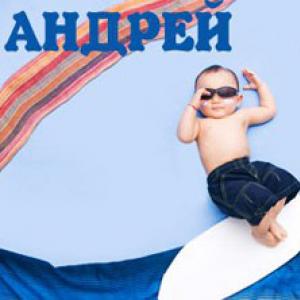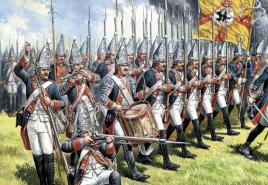Kazan orphan from where. Why is the orphan always from Kazan? (Origin of famous expressions). Whipping boy
Do you know, my dear readers, the meaning of the phraseological unit “Kazan orphan”? Surely you have heard this expression! Or maybe they themselves used it in speech, addressing someone with irony?
Let's find out together the origin of this phrase. After all, it sometimes happens that you know the meaning and meaning, you understand its definition and what it means. But it would be interesting to know the exact historical origin of the expression “Kazan orphan” and where it came from.
If with the first word of this catchphrase Everything is more or less clear, but with the second it’s somehow not very good. Why is the orphan from Kazan, and not Moscow or, for example, Krasnodar? Are there some special orphans in Kazan, or what? 😆
Questions, questions... And there are answers to them too, and even several. And they are all connected with the history of the Russian state, with Russian rulers.
The first version is the most common and plausible. As a result of only the fifth attempt, Ivan-4 managed to take the city of Kazan, the capital of the Kazan Khanate. Even from the defeat, the defeated Tatar princes - the Murzas - decided to extract more benefits for themselves.
Having already once received material gifts from the king for their humility and obedience, some of them regularly sought a royal audience. Presenting themselves as very unhappy and impoverished, while complaining about their hard life, which was, of course, not true, they begged for additional favors.


Some openly flattered the king, and some voluntarily accepted Christianity, as this was encouraged by rich gifts and high positions. It was precisely such hypocritical “poor people” and such complainers who were mockingly nicknamed the Kazan Orphans.
From there it went: those who call themselves poor, disadvantaged, constantly complaining about their hard lot in the hope of getting some benefit for themselves, but, in fact, are not, are called an orphan, and even an orphan from Kazan.


Most often, this expression is used with sarcasm.
Version No. 2. How they profited from someone else’s misfortune
There is another option for explaining this generally widespread phraseological unit. Here, too, we couldn’t do without Ivan-4. After the Russian Tsar managed to destroy the Kazan Khanate and capture its capital, he showed everyone his character. It’s not for nothing that Grozny was called formidable.


A few days after Kazan began to belong to the Russians, by order of the Tsar, an old cart or cart was rolled out into the central square of the city. The entire male population of the city was forced to pass by this cart.
The condition was this: anyone who was taller than the wheel of this cart, and therefore was already an adult who could easily take part in the battle against Russian troops and defend the city, was immediately executed and beheaded. The city was drowned in blood. The only survivors were women, old people, fatherless children and orphans.
And then the king ordered them to go and talk everywhere about the fall of the Khanate. So the children walked around in groups of several people, telling everyone about who they were and where they came from, begging for alms. This is how this expression appeared. Seeing poor, hungry children, people said: “This is the Kazan orphan.” Naturally, they took pity on the children, helped them, gave them food and clothes.
But over time, people began to speculate on this and, together with the Kazan orphans, everyone, both Kazan and non-Kazan, went and begged, while telling fictitious “compassionate” stories.
The people found out about this, and attitudes changed. After this, they began to say with mockery: “There comes the Kazan orphan,” which means a deceiver, a rogue. Does this remind you of our days? The world has changed little over the centuries... 😀
Version No. 3. Not the orphan of Kazan, but the Empress of Russia!
There is another version, something like a historical joke. Another crowned person is already participating here: Catherine-2. If you tell it briefly, you get the following story of the origin of this generally widespread phraseological unit.
When the empress arrived in Kazan, she was greeted with numerous gifts and honors. To which she allegedly said: “You greet me with such pomp, as if I had nothing myself. It’s like I’m an orphan from Kazan.”


By the way, the memory of this visit to the royal person was preserved in Kazan for many centuries. There are still many objects in the city’s museums as reminders of this event.
One of these historical exhibits is the carriage of Empress Catherine II. The original is kept in the museum, but a life-size copy is now available to anyone. It is located on the famous pedestrian Bauman Street in Kazan, where everyone can feel like a king or queen by taking a photo while sitting in a “royal” place.
These are the options for what the expression means and why they say “Kazan orphan”. But choosing what to believe and what not is entirely up to you.
Well, if you are going to Kazan, the capital of Tatarstan, then you will definitely not regret the days spent here. will not leave anyone indifferent. There are a great variety of them here, and they can satisfy any tourist’s interests. The places I was able to visit are marked on this map.
Or maybe you have other information: where did this expression come from, what events preceded its occurrence. Write about it in your comments. I will be very happy and grateful.
Where did the expression “orphan of Kazan” come from? and got the best answer
Answer from Mitrofanushka[guru]
Orphan of Kazan - this expression was born in the 16th century. After Ivan the Terrible conquered Kazan, the Kazan murzas (princes) had to pretend to be poor and unhappy in order to obtain incentives and rewards from the new owner. Since then, people mockingly call anyone who becomes poor for his own benefit a Kazan orphan.
In the 17th century, Tsar Alexei Mikhailovich generously rewarded those Tatars who decided to change their faith. IN historical documents There are many examples of ordinary rogues and beggars receiving royal awards, gifts in the form of salaries, sable fur coats, silver ladles, cups, pearls, velvet, satin, and horses.
The “Kazan orphans” were always treated kindly by the royal court. Excessive concern for a foreign tribe that has caused so much trouble to the Russian people, at first glance seems unjustified. But on the other hand, such a policy pulled representatives of the Tatar nobility under the shadow of the Russian throne.
Answer from Yolon[guru]
There lived an orphan in Kazan. Nobody loved her. So the expression spread like a meme.
Answer from Alexander Fedorchuk[expert]
Since the 90s, when groups in Kazan shot at each other
Answer from Alexey Chernitsky[guru]
Field of the capture of Kazan by Ivan the Terrible
Answer from Motaro Core[master]
In October 1552, the army of Ivan the Terrible took the city of Kazan, the capital of the Tatar Kazan Khanate. A considerable territory of the Khanate came under the rule of Moscow. To keep the Tatar population submissive, the Russian authorities tried to win over the Tatar nobility, the princes - the Murzas. The princes, for the most part, quite willingly met the new government halfway, trying to maintain their position and wealth. Many of them converted to Christianity, received gifts from the Tsar and went to Moscow to join the Tsar’s retinue there. Our people began to mockingly call these princes and princes “Kazan orphans” - at court they became poor, tried to get as much money as possible more rewards and "salaries".
“The Orphan of Kazan” is a person pretending to be unhappy in order to evoke the sympathy of compassionate people; in this sense, we still use the old nickname as a saying.
The meaning of the phraseological unit “Kazan orphan” and its history What the expression “Kazan orphan” means, most likely, everyone knows, because in speech we very often use this phraseological unit. But what is the story, and why is the orphan from Kazan - we will try to find an answer to this question. The Russian language is rich in phraseological units. For example, a person who tries to evoke self-pity and shows himself to be unfairly offended and disadvantaged is often called the “Kazan orphan.” The meaning of the phraseological unit is very simple and understandable. It carries both pity and a share of mockery, irony at those who are trying to seem pitiful. Very often a person who constantly complains about his failures, but is to blame for them, is also called the “orphan of Kazan”. Now this phrase is so firmly entrenched in our speech that sometimes we don’t think about what the original meaning of this epithet is - “Kazan orphan”. The meaning and origin of phraseological units, meanwhile, are very interesting and have their roots in the distant past. A little history We all remember the numerous conquests of Ivan the Terrible. “Kazan took, Astrakhan took, Rhubarb took” - famous catchphrase from a comedy film. The meaning of the phraseological unit “Kazan orphan” and its history precisely refer to the valiant time of the capture of Kazan. The soldiers of Ivan the Terrible tried to capture the Kazan Khanate three times, but the attempts were unsuccessful. There was no order and coherence in the army. And so Ivan the Terrible came up with a cunning move, which consisted of besieging the city and gradually narrowing the “ring,” as a result of which the city was left without sources of food and help. The idea was a success, and Kazan was taken even faster than the most experienced warriors expected. The Crimean Khan did not have time to help either, which also played into the hands of the Russian Tsar. What did Ivan the Terrible do with the captured Kazan princes? Tried to make them allies. He left them all their possessions, generously endowed them, bet on public service with a good salary - all so that the Kazan Khanate would have loyal subjects. The origin of the phrase “Kazan orphan” So we come to the most important thing: the meaning of the phraseological unit “Kazan orphan” was formed during the capture of Kazan. This is how they began to call those same Kazan khans, showered with all sorts of favors, but constantly complaining about their bitter fate and begging for more and more benefits for themselves. In their petitions to the Tsar, they often called themselves “orphans.” Russian boyars, seeing one of these unfortunate khans, said with a grin: “Here is an orphan from Kazan!” The expression quickly spread, penetrated into all corners of the large country and after a short time acquired a figurative meaning - exactly the one in which we use this phrase to this day. Another version There is another point of view that explains the phrase “Kazan orphan”. The meaning of the phraseological unit goes back to the same historical era - the capture of the Kazan Khanate by Ivan the Terrible. The fact is that after the conquest of Kazan, many families were completely killed, and in some only small children survived. They were ordered to be raised by peasants, boyars and even nobles in various cities and villages of Rus'. Such children began to be called Kazan orphans. But using the phrase in this sense did not have an ironic meaning. Rather, it was sympathetic: the phrase was used in relation to a child left without parents and given into the care of strangers, in an alien culture. Phraseologism in our days Although many years have passed since those distant events, the phraseological unit “Kazan orphan” is firmly entrenched in speech and is actively used to this day. It can be heard in everyday communication, see on the pages of works fiction. Although not everyone thinks about the historical meaning of the expression, they use it quite often. The meaning of the phraseological unit “Kazan orphan” is played out in the touching New Year’s film by Vladimir Mashkov, but the meaning put into it is rather sympathetic than mocking. The film is about a Russian girl, a teacher, trying to find her father, who did not even know about her birth. Three men responded to her letter at once, each of whom could turn out to be the one she was looking for. This is how a girl, who until recently was considered an orphan, found three wonderful fathers at once!
“It’s a no brainer” - this expression became famous thanks to Mayakovsky’s poem (“It’s even a no brainer - / This Petya was a bourgeois”). It appeared in Soviet boarding schools for gifted children. They recruited teenagers who had two years left to study (classes A, B, C, D, D) or one year (classes E, F, I). Students of the one-year stream were called “hedgehogs”. When they came to the boarding school, the two-year students were already ahead of them in the non-standard program, so at the beginning school year The expression “no brainer” was very relevant.
In the 19th century, gamblers resorted to a trick: during the game, using a special adhesive composition, they applied additional points (red or black marks) from powder to the cards, and if necessary, they could erase these points. This is where the expression “to rub glasses” comes from, meaning to present something in a favorable light.
Whipping boys in England and other European countries of the 15th - 18th centuries were boys who were brought up with princes and received corporal punishment for the prince's misdeeds. The effectiveness of this method was no worse than direct flogging of the culprit, since the prince did not have the opportunity to play with other children except the boy with whom he established a strong emotional connection.
Tyutelka is a diminutive of the dialect tyutya (“blow, hit”), the name for an accurate hit with an ax in the same place during carpentry work. Today, to denote high accuracy, the expression “tail to neck” is used.
Previously, the nose was called not only a part of the face, but also a tag that was worn with oneself and on which notches were placed to record work, debts, etc. Thanks to this, the expression “hack on the nose” arose. In another meaning, the nose was a bribe, an offering. The expression “to stay with the nose” meant to leave with an unaccepted offering without reaching an agreement.
After ancient doctors discovered nerves in the human body, they named them by their resemblance to strings musical instruments the same word - nervus. This is where the expression for annoying actions came from - “playing on your nerves.”
Today in French V Everyday life the word assiette means "plate". However, earlier, no later than the 14th century, it meant “the seating of guests, their position at the table, that is, near the plates.” Then, with the expansion of the circle of connections, the assiette became the “location of a military camp” and then the city. In the 17th century the word absorbed all the “specifics” of possible “positions” and began to mean any “position” in general... In the same century, assiette also acquired a figurative meaning - “state of mind.” Russian Bare, who spoke and even thought in French, apparently did not particularly care about the accuracy of the Russian language even in the 18th century. they “translated” the French phrase in their own way: instead of “position”, “not at ease” got into the Russian phraseological unit from the original language. It was thanks to their negligence that such a beautiful figurative expression appeared in the Russian language!
After the capture of Kazan, Ivan the Terrible, wanting to bind the local aristocracy to himself, rewarded high-ranking Tatars who voluntarily came to him. Many of them, in order to receive rich gifts, pretended to be severely affected by the war. This is where the expression “orphan of Kazan” came from.
WALKING THROUGH THE RED THREAD
By order of the English Admiralty, since 1776, when producing ropes for the navy, red thread must be woven into them so that it cannot be removed even from a small piece of rope. Apparently, this measure was intended to reduce rope theft. This is where the expression “to run like a red thread” comes from main idea the author throughout the entire literary work, and Goethe was the first to use it in the novel “Selective Affinity.”
In the pre-revolutionary alphabet, the letter D was called “good.” The flag corresponding to this letter in the code of signals of the navy means “yes, I agree, I authorize.” This is what gave rise to the expression “give the go-ahead.”
Beluga The silent beluga fish has nothing to do with the expression “beluga roar,” which means to scream or cry loudly and strongly. Previously, beluga was the name given not only to fish, but also to the toothed whale, which today is known to us as beluga whale and is distinguished by its loud roar.
BLUE BLOOD

Spanish The Royal Family and the nobility were proud that, unlike the common people, they traced their ancestry to the West Goths and never mixed with the Moors who entered Spain from Africa. Unlike the dark-skinned commoners, the upper class had blue veins on their pale skin, and so they called themselves sangre azul, which means “blue blood.” From here this expression for denoting aristocracy penetrated into many European languages, including Russian.
IN Ancient Rus' The rolls were baked in the shape of a castle with a round bow. Townspeople often bought rolls and ate them right on the street, holding them by this bow or handle. For reasons of hygiene, the pen itself was not eaten, but was given to the poor or thrown to be eaten by dogs. According to one version, about those who did not disdain to eat it, they said: they got to the point. And today the expression “reach the pen” means to completely descend, to lose human appearance.
SPREAD YOUR THOUGHT OVER THE TREE
In “The Tale of Igor’s Campaign” you can find the lines: “The prophetic Boyan, if someone wanted to compose a song, his thoughts spread across the tree, gray wolf on the ground, like a gray eagle under the clouds.” Translated from Old Russian, “mouse” is a squirrel. And because of incorrect translation in some editions of the Lay a humorous expression appeared: “to spread one’s thoughts over the tree,” which means to go into unnecessary details, to be distracted from the main idea.
“Skeleton in the closet” is an English expression meaning a certain hidden biographical fact (personal, family, corporate, etc.), which, if made public, can cause significant damage to one’s reputation. The appearance of the expression is associated with medicine. Doctors in Britain were not allowed to work with dead bodies until 1832. And the only bodies available for dissection for medical purposes were those of executed criminals. Although the execution of criminals was by no means uncommon in 18th-century Britain, it was unlikely that a particular doctor would have had many corpses in his possession during his work history. For this reason, it was common practice for a doctor who had the good fortune to dissect the corpse of an executed criminal to preserve the skeleton for scientific research purposes. Public opinion at the same time, it did not allow doctors to keep the skeletons in sight, so they were forced to keep them away from prying eyes. For this reason, many suspected that doctors kept skeletons somewhere, and one of such places could be a closet.
Kazan (Kazan) orphan Razg. Iron. A person who, wanting to pity someone, pretends to be unhappy, offended, helpless. - There is no point in singing Lazarus! - Flenushka interrupted him. - How to eat a real Kazan orphan! No, dear friend, you won’t pity me!(Melnikov-Pechersky. In the forests). - Original: about the Tatar mirzas (princes), who tried after the conquest of the Kazan kingdom by Ivan the Terrible to receive all sorts of concessions from the Russian kings, complaining about their bitter fate. Lit.: Dictionary Russian language / Edited by prof. D. N. Ushakova. - M., 1940. - T. 4. - P. 192.
Russian phraseological dictionary literary language. - M.: Astrel, AST.
A. I. Fedorov.
2008. See what “Kazan (Kazan) orphan” is in other dictionaries:
Kazan (Kazan) orphan- Talk. A person who pretends to be unhappy, offended, helpless, etc., in order to evoke the sympathy of compassionate people. FSRY, 425; BMS 1998, 524–525; FM 2002, 432; Mokienko 1986, 33 ... orphan
- s; pl. orphans and (colloquial) orphans; m. and f. 1. A child or teenager who has lost one or both parents. He was left an orphan early. She grew up an orphan. I have neither father nor mother, I am with. Round (round) s. (without father and mother). // About a lonely person... ... encyclopedic Dictionary ORPHAN
- Kazan (Kazan) orphan. Razg. A person who pretends to be unhappy, offended, helpless, etc., in order to evoke the sympathy of compassionate people. FSRY, 425; BMS 1998, 524–525; FM 2002, 432; Mokienko 1986, 33. Living as a Kazan orphan. Sib. Be… … Large dictionary of Russian sayings orphan
- s; pl. orphans and (colloquial) orphans; m. and f. 1. A child or teenager who has lost one or both parents. He was left an orphan early. She grew up an orphan. I have neither father nor mother, I am with. Round (round) s. (without father and mother). // About a lonely person... ...- s, plural orphans, women and men 1. A child or teenager who has lost one or both parents. Only I, poor thing, became an orphan and left without a mother. I. Nikitin, For what guilt and misfortune. [Upmanis:] You are an orphan. You have neither father nor mother. Would you die with... Small academic dictionary
Kazan (Kazan) orphan- ORphan, orphans, many. orphans (orphans of the region), male and wives A child or minor whose father and mother or one of the parents are deceased. Orphan (see round). Be left an orphan. ❖ Kazan or Kazan orphan (colloquial ironic) person,... ... Ushakov's Explanatory Dictionary
- Kazan or Kazan orphan (colloquial irony) a person pretending to be unhappy, trying to pity someone. by their imaginary deprivations [from the former Tatar mirzas from Kazan, who, after its conquest, enjoyed the favors of the Moscow kings]. Not … Phraseological Dictionary of the Russian Language Kazan
Kazan- oh, oh. adj. to Kazan. ◊ Kazan (Kazan) orphan about a man pretending to be unhappy in order to pity someone. There’s no point in singing Lazarus!.. Flenushka interrupted him. How is there a real Kazan orphan!.. No, dear friend, I’m not... ... orphan
complain about life- ▲ complain in (direction), a person’s life complain about fate. oohs and sighs. nagging. whine. whining. whine. whine. whine. dissolve the nursery. cry. cry [cry. owls/nesov] in a vest to whom (colloquial). sing Lazarus. | sprinkle on your head... ... Ideographic Dictionary of the Russian Language
KAZAN- male, Tatar. (hence the name of the city) boiler, esp. a large, sunken or buried cauldron; distillery boilers are called kazan, also flat, copper boilers at wax slaughterhouses, etc. Kazanok, kazanets, kettle. Kazan buhma kaz, dumplings. Kazan kabav... Dahl's Explanatory Dictionary







